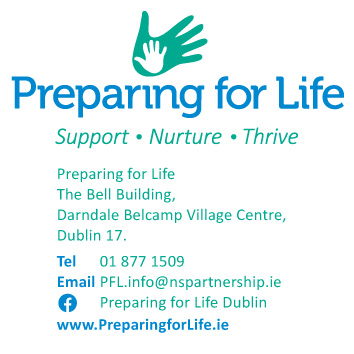
The National Childcare Scheme: An Open Letter to Minister Roderic O'Gorman
- Oct, 2021
- |

Monday, 04 October 2021
An Open Letter To
Mr. Roderic O’ Gorman; Minister for Children, Equality, Disability, Integration and Youth.
Dear Minister O’Gorman,
My name is Leah Russell, I am the Early Years Coordinator in Preparing For Life, an Area Based Childhood Programme based in Dublin 17. I am writing to you to represent a cohort of Community Based Not-For-Profit Early Years Services who provide support to families in our community. We would like to draw your attention to some concerns raised by managers in regard to the National Childcare Scheme.
The National Childcare Scheme (NCS) was launched in 2019 and hailed to be the one stop shop for parents and Early Years Education providers. The scheme was to give all parents an opportunity to get financial support for their ‘childcare’ fees while removing the administrative burden of funding applications for providers. Parents would make their applications for funding via the online portal and pass that information on to providers using their unique code which would be inputted by the provider into an online portal and the Early Years Service gets payment directly from Pobal on behalf of the parents for their child’s care. In reality the IT system is notoriously difficult for parents to navigate, and the funding granted to families is not always consistent. There are serious concerns amongst providers that loss of funding could potentially close Community Not-For-Profit Early Years Services and have significant long-term impact on families who access these vital supports.
Families Experiencing Disadvantage
Community Not-For-Profit Early Years Services were originally designed to support local families experiencing disadvantage. These services can be situated within communities where families have difficulties engaging in external resources and support. Our services not only provide quality early education experiences to children, but also provide family support, early intervention, support with referral pathways and child welfare concerns to name but a few. Furthermore, Early Childhood Education has been proven to build the foundations for learning for young children and is vital in breaking the cycle of disadvantage. There is an extensive body of international evidence that highlights the critical importance of Early Childhood Education as a buffer against adverse childhood experiences such as parental stress, unemployment, homelessness, addiction, loss of a parent etc. (Weikart, Bond and McNeil, 1978, The Effective Provision of Pre-School Education [EPPE] Project, 2003). The NCS does not recognise this. Investing in the needs of young children and families during the child’s early years will have long term benefits for not just the child but for the economy too as evidence has demonstrated a yield of €4-€7 return on every €1 spent on quality Early Childhood Education (Heckman, 2011).
There is a complex network of factors that can prevent a person taking up employment, these can include disabilities, physical or mental health issues, education etc. Children of parents not employed outside the home are not entitled to full subsidies through the NCS. The entitlement is 15 hours per week for these families through the scheme.
Previously families would have qualified for funding under schemes that subsided the cost of Early Childhood Education. For example:
- The Community Childcare Subvention (CCS) and the Community Childcare Subvention Plus (CCSP) Programmes supported parents on a low income.
- The Training and Employment Childcare programme supported parents who were studying, in training or on Community Employment schemes.
- The Childcare Education and Training Support (CETS) programme provided childcare for parents who were studying in Secondary Schools or with Local Education and Training Boards.
- The Community Employment Childcare Programme (CEC) provided childcare for children with parents who were participating in Community Employment Schemes.
All the above schemes were designed to support families experiencing disadvantage and are now replaced by the NCS.
When the NCS scheme was originally set up, the agreement was that families in need of ECCE would get sponsorship through other government departments like Department of Children, Equality, Disability, Integration and Youth, Department of Social Protection and the HSE. In this manner, families needing the support of community based early services could get referrals from social workers or public health nurses which would then provide them with entitlement to sponsorship by the relevant bodies. While the model, as outlined, had merit, in practice it has proved to be extremely complicated in implementation with some professionals working for referring bodies unsure of the process involved. Families may not meet the threshold for support from a social worker however without the support that Early Childhood Education provides, they may require this service in the future. As a result, vulnerable children are slipping through the gaps and we have had reports from all 5 of our partner services that parents are withdrawing children from early childhood education, many of whom would benefit from the support of an Early Years Service. We have seen an increase in attendance of children of working parents. While we welcome all families with open arms, we worry where the vulnerable children are and what will happen to them.
Additionally, parents engaging in education are no longer entitled to financial support and we have had a large number of parents in the community withdraw from education as they simply do not have anyone to look after their child while they attend lectures or classes. Supporting parents to continue in education is critical in helping them achieve sustainable employment and fundamental in breaking the cycle of poverty.
Administrative Burden
Parents making an application to the online NCS system need to first register on Mygov.ie and then register on the NCS system to obtain a CHiCK number. This requires ID and a certain level of IT skill. The NCS system is notoriously difficult to navigate and 90% of parents attending our community services are asking managers to make the application on their behalf. Parents are finding themselves in a position where they are sharing highly sensitive confidential information regarding their family and employment status with complete strangers. We have seen parents withdrawing from the application process as they are finding it too stressful or invasive. This has been the experience of all 5 managers within our community registered on the NCS scheme.
Managers are spending extensive amounts of time chasing CHiCK numbers on behalf of parents and registering families on the system because if they don’t no one else will.
When a family finally gets their application approved, the payment does not backdate fees to cover the application process. This leaves Early Years Services in a precarious position as parents cannot cover fees for that period therefore the service bear the financial burden for these fees.
Managers have all said they now spend a significant amount of their day taking care of the administrative aspects of the NCS which includes weekly returns and reconciliations of attendance against hourly payments. The consensus is that each service would benefit from employing an administrator whose sole responsibility would be to work on NCS paperwork and returns. There is no funding for this role under the NCS and the services are not in a position to cover the costs of employing a person for this sole purpose.
Cuts to Funding
Community based not-for-profit Early Years Services rely solely on subsidised fees to cover costs. There is a common misconception amongst private providers that community services are heavily funded and subsided by the government when this simply is not the case. All ECCE services have seen substantial cuts to funding over the past decade while also having to cover increased costs in insurance, light, heat, and wages.
Community Not-for-profit services were financially dependent on the CCS programme over the past few years. This funding model was aimed at making early education and care accessible for low-income families. The maximum rate of funding received was €145 per week, with parents making a financial contribution.
With the NCS the hourly rate is considerably less than the CCS rate, with pre-ECCE children only being awarded €5 per hour. If a family are successful with the sponsorship process, services receive an hourly rate with no parent contribution allowed. With the loss of CCS funding, and a significantly lower hourly subsidy, services are at risk of reducing the level of resources and services they provide leaving families with less support.
The NCS community services are bearing the burden of deficits in funding. While families go through the application process there are 2 choices; either the child attends the service while awaiting approval or their space is held until they get approval. NCS payments are not backdated, so the service takes the burden for the financial cost. Overheads still need to be covered regardless of whether a child attends the service or not.
Over the past 2 years there have been lots of difficulties with the online system and families have had to revert to administrators due to errors, again funding has stopped for the Early Years Service and they have to bear the financial cost for this anomaly. Managers in our partner settings have experienced this and some services are losing funding for up to 5 children on a weekly basis as a result.
Furthermore, any changes the family makes to their account will trigger the system to cease funding for the Early Years Service and the family must reapply for a new CHiCK number. The process starts all over again, NCS payments are not backdated, and the Early Years Service again bears the burden of the financial cost. For example, if the parent is notifying the NCS of the birth of a new baby.
When children have a birthday the amount of funding the family are entitled to also automatically changes. For example, an 11-month-old child attending a baby room will turn 1 and funding will automatically be reduced. It is not practical to switch this child to a toddler room simply because they have now turned 1. There may not be a space, or the child may not be developmentally ready. The costs of running a baby room are higher and once again the Early Years Service must bear the financial cost.
With the discontinuation of the CCS programme, School Aged Childcare (afterschool) has also been particularly affected. Many families who rely on School Aged Childcare are no longer entitled to subsidised hours under the NCS. As many parents are not in paid employment, their children are no longer seen as in need of the service. However, for many marginalised families we provide early intervention and family support that is essential for child development and family well-being. By not attending our services many children have lost access to vital supports such as a safe indoor/outdoor space to play, balanced and nutritious meals, supportive adults to help with homework and those who have English as a second language and positive relationships thereby lessening the effect of disadvantage.
The loss of funding has been largely masked over the past 18 months by the Wage Subsidy Scheme due to Covid, however this has now ceased, and there is concern amongst community providers about the implications of an unexpected loss of funding due to NCS administrative errors.
What is the solution?
Providers not only provide ‘care’ to children, we are educators and professionals. We are governed by the Department of Education, and we have a specific curriculum which was designed by the National Council for Curriculum and Assessment, the same council that has written curricula for both Primary and Post Primary Education in Ireland. As such, there have been suggestions from government representatives regarding the introduction of a DEIS type model in place of current funding models. Although not without its flaws, this could be a place to start discussion. We would welcome a review of international models such as the Sure Start model in the UK where they have developed children’s centres and support networks to support communities experiencing disadvantage.
We would welcome a review of the current funding model for Community based not for profit services. Perhaps this could occur on an annual basis meaning services can budget effectively, annual returns and reviews could take place similar to compliance visits to ensure administration is kept to a minimum and there is minimal risk of experiencing withdrawal of funding.
In theory the introduction of a streamlined funding application process should have reduced the administrative burden for Early Years Managers, but it does not account for families needing support in the application process or those who may not quite fit the criteria for engagement with social workers. These families and children are some of the most vulnerable in our country and the support a community based Early Years Service can provide can make an immeasurable difference for their children.
We worry that the children in our community, a community deemed to be one of the most disadvantaged in Ireland are being further marginalised from those with working parents and higher incomes. Children living in areas where gang violence is an everyday occurrence are not being given the opportunity to learn and play in a safe environment where they can be supported by skilled educators and nurtured to reach their full potential.
We are asking for a review of the NCS and referral processes to determine their efficacy in terms of supporting families accessing Community Not-For-Profit Early Childhood Education and School Age Childcare.
We would like to offer our expertise where needed to this review process and would welcome a visit from any government representatives who would like to discuss matters further or speak to managers in our partner services.
Yours sincerely,
_________________
Leah Russell
Early Years Coordinator
Preparing for Life
Written on behalf of Community Early Childhood Education Providers in Dublin 5, 13 & 17.
Doras Buí
Bunratty Community Childcare
Darndale Belcamp Integrated Childcare Services
Kilbarrack Foxfield Preschool
Edenmore Early Education Centre
